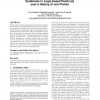Free Online Productivity Tools
i2Speak
i2Symbol
i2OCR
iTex2Img
iWeb2Print
iWeb2Shot
i2Type
iPdf2Split
iPdf2Merge
i2Bopomofo
i2Arabic
i2Style
i2Image
i2PDF
iLatex2Rtf
Sci2ools
SAC
2008
ACM
2008
ACM
Symbiosis in logic-based pointcuts over a history of join points
Within aspect-oriented programming, the quality of aspect code depends on the readability and expressiveness of pointcut languages. Readability is increased by using specialized, declarative pointcut languages. For such languages, their expressiveness is increased if they offer an integration with the base code language. As has previously been shown, offering access to the past history of the base program also increases pointcut expressiveness. A logical desire then is creating pointcut languages that combine both features, but taken to the extreme this is not implementable. We discuss the unimplementable ideal model of declarative history-based logic pointcut languages, and the possible approximations that can be made that are still implementable and what limits they impose on the ideal expressiveness. Categories and Subject Descriptors D.3.3 [Programming Languages]: Language Constructs and Features Keywords Aspect-oriented programming, Multi-paradigm programming, Logic-based pointcu...
| Added | 28 Dec 2010 |
| Updated | 28 Dec 2010 |
| Type | Journal |
| Year | 2008 |
| Where | SAC |
| Authors | Kris Gybels, Charlotte Herzeel, Theo D'Hondt |
Comments (0)

